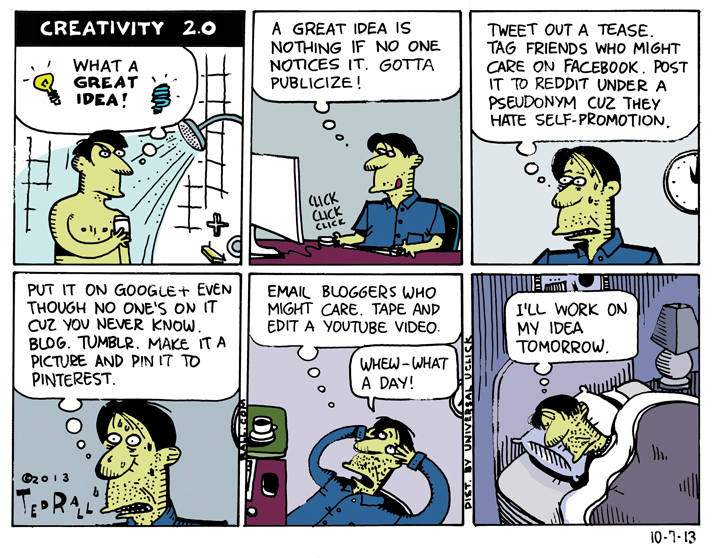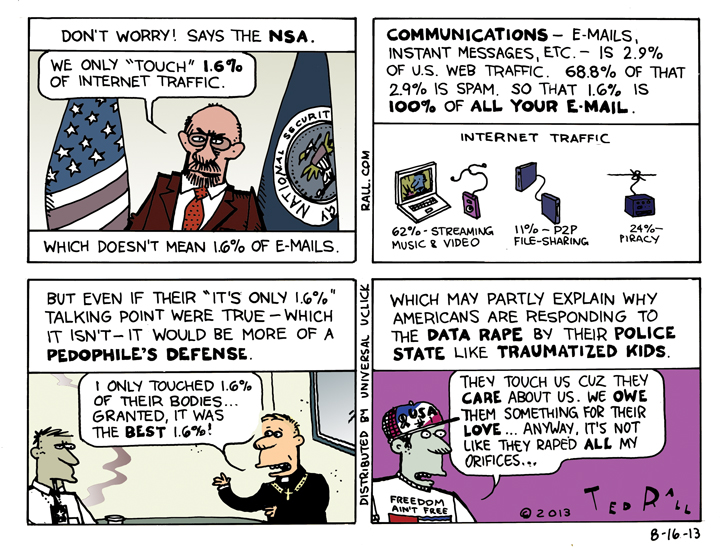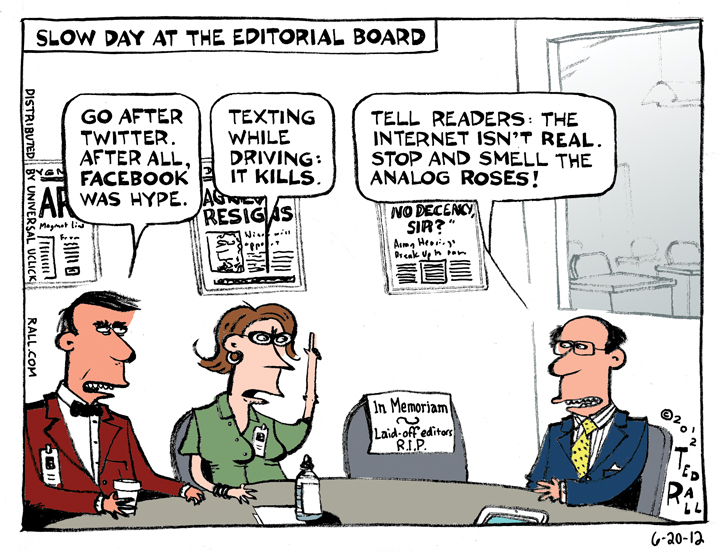
Tips for Targets of Online Hatefests
Over the holiday weekend I found myself in a uncomfortable yet not entirely unfamiliar place. I was the target of the online equivalent of the Two Minute Hate in Orwell’s “1984.”
The subject: the way I draw President Obama. Which I’ve been doing since 2009. But this column is not about that. It’s about a few things I’ve learned about how online witch hunts and mob mentality have evolved in recent years.
Like other cartoonists I’ve taken heat before, notably over my “terror widows” and Pat Tillman cartoons from 2002 and 2004, respectively. During the grim years following 9/11, bloggers on the far right of America’s political fringe repeatedly issued furious rants calling for me to censored, imprisoned, tortured, raped and/or assassinated. Well, hey, it’s nice to be noticed.
Ten years later, the anatomy of the Internet pile-on has changed, and it reveals some interesting changes in American political culture. The knee-jerk nationalism of the Bush years has given way to a form of political correctness on steroids under Obama, with identity politics running amok. Influenced by social networks, the comments sections of political discussion websites have adopted like/dislike ratings systems that amplify groupthink. In contrast to the 2000s, when right-wing haters threatened lefties’ lives more than their livelihoods, conservative Obama Democrats are more likely to censor you than to threaten to kill your family.
To be sure, the basic characteristics of TwoMinuteHate.com remain the same. Internet mob rule still relies on the power of suggestion; when people follow a link that urges Click Here to See a Terrible Horrible Witch, they’re more likely than not to see, well, a horrible witch.
I call this the Comedy Club Effect. 99.99% of stand-up comics aren’t funny. Yet most people laugh at most of their (bad) jokes. People who spend $30 plus a two-drink minimum are preconditioned to have a good time. Having a good time at a comedy club requires laughing. So the audience laughs.
The mandatory drinks help.
After I was introduced as “America’s funniest cartoonist” at a talk in Chicago I apologized — in a straight-ahead, not even trying to joke way, for being late, explaining that I’d gotten stuck in traffic from O’Hare. Everyone laughed.
The corollary of the Comedy Club Effect is that when people are preconditioned to hate, they tend to hate well and often. Washington Post columnist Richard Cohen experienced this when his “what if I were a bigot” musings (“people with conventional views must repress a gag reflex“) about New York Mayor-Elect Bill de Blasio’s biracial family drew calls for his firing and unsubstantiated assertions that these were really Cohen’s thoughts. It was the exact 180-degree opposite of fair: If anything, white conservatives “with conventional views,” rather than progressives, should have been angry at Cohen for attributing bigotry that the conventional types hadn’t expressed.
Like other targets of media pile-ons, I find it hard to accept that angry people who are yelling at you are open to nothing you have to say. Explanations don’t help. Apologies don’t stop them. They just want to yell at you. Anything you say can and will be used, distorted and twisted against you in the court of Twitter.
If you’re smart, you’ll duck and cover, leaving your allies and fellow travelers to run interference for you and defend your cyberhonor. But your defenders won’t get far. Dissenting voices get shouted down too. Anything they say will be similarly twisted and they’ll be accused of being your toadies and shills. In the end, they’ll get ground down by endless demands to repeat themselves until they finally fade away, leaving the field to your attackers’ hundreds of comments, all of which will remain forever Google-able to your future might-have-been employers.
There’s no way you can win. All you can do is conserve your energy until the mob moves on to burn down someone else’s house.
As always, commenters have strong opinions about, for example, cartoons they haven’t actually seen.
My latest imbroglio brought me into contact with such relatively recent additions to the PC canon as “whitesplaining” and “mansplaining.” According to the Urban Dictionary, whitespaining is “the paternalistic lecture given by whites toward a person of color defining what should and shouldn’t be considered racist, while obliviously exhibiting their own racism” and mansplaining is “the tendency of some men to mistakenly believe that they automatically know more about any given topic than does a woman and who, consequently, proceed to explain to her — correctly or not — things that she already knows.”
A more lucid definition is for the suffix “‘splaining,” which Geek Feminism calls “a form of condescension in which a member of a privileged group explains something to a member of a marginalized group — most particularly, explains about their marginalization — as if the privileged person knows more about it.”
As a white male, in other words, I can imagine how irritating it would be to hear a white guy like me tell someone who isn’t white or male about their experience as a disadvantaged minority. But I can’t know how they feel.
Obviously, this is true. The trouble is that, on sites like Daily Kos, where the majority views are pro-Obama and pro-Democratic Party no matter what they do, the cries of “whitesplaining” and “mansplaining” are used to stifle not condescension, but disagreement.
Speaking about the controversy over the way I draw Obama, the founder of Daily Kos refused to weigh in with his opinion over whether or not I am racist. “Don’t be that white guy telling African-Americans what is and isn’t racist,” sayeth Markos Moulitsas. 1300 comments or so later, someone finally asked: “If white guys have no right to voice an opinion about racism, I’m curious if minorities expect white guys to say anything at all about racism (except for racist statement, of course)? After all, if your opinions simply aren’t welcome, can you really expect people to engage in a debate?”
Daily Kos is one of many sites that have adopted Facebook-style like/dislike rating systems. Viewers may click “recommend (+)” or “hide (-)” on blog entries as well as individual comments. Items with more thumbs up add to a poster’s digital “mojo” on the site. Items with more thumbs down get hidden from view and subtract from mojo. Run out of mojo and you can’t post anymore. You are unpersoned, like in “1984.”
The link aggregator Reddit demonstrates the problem with this system. Post cute kittens and your ratings soar. Post anything controversial — say, something about Edward Snowden — and the hates will more than cancel out the likes. Reddit is a place where anything less than totally insipid goes to die. I assume they like it that way.
At Kos they call this “community moderation.” It sounds democratic. In practice, the Rec/Hide system is toxic, stifling and distracting, prompting long threads of comments by people complaining about one another’s hides and recs, and threatening to get even for them. (What were we talking about again?) There are secret Facebook pages for various gangs of Kossacks, who swoop into certain posts to rec or hide them into glory or oblivion, as the case may be.
It sounds silly. It’s what happens when people have too much time on their hands.
But this manipulation of online political discussion has a real-world effect: it crushes anything that disagrees with the hive mind — a collective mentality that becomes more lockstep because of it — and it kills anything new or interesting. Worst of all, casual browsers could be forgiven that nothing new or interesting or taking issue with this mainstream/generic view (in the case of Kos, unquestioning support for Obama and the DNC) exists.
I posted a blog defending myself and explaining why I draw Obama the way I do to Kos. It received many recommendations and attracted hundreds of comments. Unfortunately, you can’t find it anymore. It was “hide rated” by pro-Obama Kossacks.
Forgive me if I’m wrong, but I don’t think the Internet was supposed to turn out like this.
(Ted Rall’s website is rall.com. Go there to join the Ted Rall Subscription Service and receive all of Ted’s cartoons and columns by email.)
COPYRIGHT 2013 TED RALL











